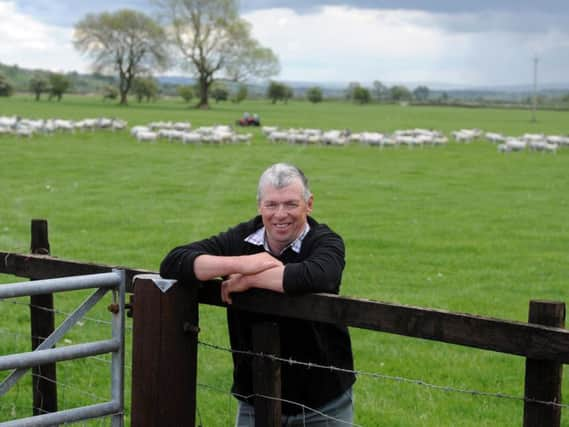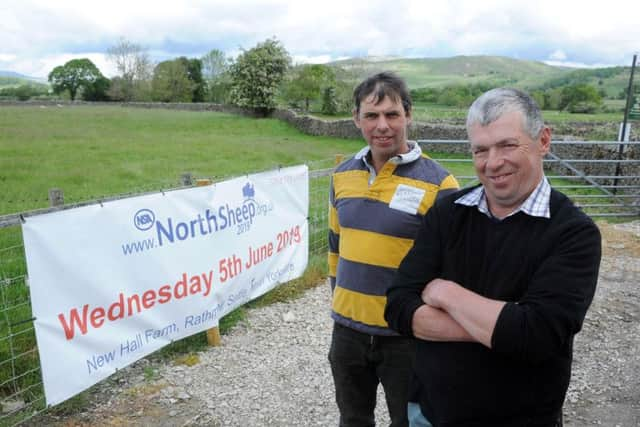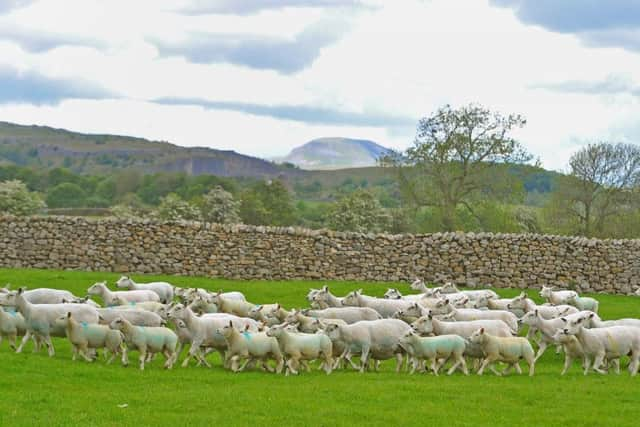Frankland family prepare to open farm gates for NSA North Sheep


Public goods agenda seen as a threat but must be engaged, sheep farmers toldNew lamb age rule could be worth millions to sheep industryStay up to date with all the latest rural affairs news, views and features by joining our new Facebook groupThese are exceptional circumstances as the family prepares to host the biannual North Sheep event on Wednesday when farmers, breeders, nutrition companies, livestock auctioneers, industry experts and suppliers to the sector will descend upon the farm in their thousands and everything has to be just right.
Normally at this time, the Franklands would have sent some of their best lambs from this year’s crop to market for the early trade but they’ve held back ensuring their stock, just as much as their land and buildings, looks the best it can be. Since this year’s lambing finished the focus has been on putting in the hours, the sweat and the grind.
Advertisement
Hide AdAdvertisement
Hide Ad“Anyone who thinks you get a massive pay cheque to host North Sheep is a bit misguided,” says Richard, who was first approached to have the 280-acre New Hall Farm considered as a host venue nearly two years ago by the National Sheep Association’s manager and events organiser Heather Stoney-Grayshon.


“You don’t come out of it financially wrong, but it’s not like you make any money out of it. We’ve put in and we’re still putting in lots of time and energy, which we’ve been happy to do because hosting North Sheep has to be one of the biggest honours you can get from your peers, but as the Wilsons of Beckwithsaw who hosted a few years ago will say, it takes a lot of preparation.
"Chris has been creosoting the farm buildings for weeks and we’ve used twelve 25-litre drums of it. The gateways all look fantastic now. We were all very nervous about a month ago, but the weather has given us a massive lift and we’re into the final throes.”
The family enterprise includes junior partners Jon, Richard’s son, who concentrates on the 1,200 breeding ewes; Pam his daughter and her husband, Thomas, who operate the 220-cow dairy farming operation at Long Bank Farm four miles away. It is all run as one business with the sheep and beef operation centred on New Hall Farm, but also including land at Bent House Farm.
Advertisement
Hide AdAdvertisement
Hide AdIf the event had been held this time last year it would have been a far different story. When members of the NSA came around to make their decision on which of seven prospective farms would host, New Hall was under water.


“We’d had an awful winter and they came on a very poor day in January 2018 but they offered us the opportunity. Fortunately, the weather ever since last May has been the best 12 months I’ve ever known and the long hot summer last year did our farm so much good.
“We’ve a lot of heavy clay land and the dry sunny weather cracked the pan and has put the land in fantastic heart.”
Lambing starts in mid-February to get some earlies into the market and finishes around mid-April. Last year’s terrible spring made life a struggle for the Franklands and many more besides with lambs much slower maturing and struggling for weight. This year has been much easier and Jon, who is also a salesman for North Sheep’s major sponsors, Agri-Lloyd, is happy with their progress.
Advertisement
Hide AdAdvertisement
Hide Ad“We’ve had great lambing and never had as many lambs on the ground and thriving,” says Jon. “Our breeding flock is made up of 350 North of England Mules and more recently Cheviot Mules with the remainder including Texel X Mules, some three-quarter bred Texels and Rouge X that lamb to the Beltex tup.
"We’ve had the Rouge for about ten years to get a bit better quality lamb and they are milkier than keeping the three-quarter bred Texels.
“We’ve also moved towards the Beltex to get better shape on the prime lambs, but still like the Texel for the extra weight. We tried some Beltex X Suffolk tups this time to get a bit of extra weight for the early market. We bought some Cheviot Mules a few years ago to see how they performed against the North of England Mule ewes. They’ve done well and you do get a bit better quality lamb, so we will move more towards the Cheviot Mule.”
Around 200 Texel X Mule gimmer lambs out of the Mules are kept for replacements giving the Franklands 1,400 sheep in all and with prolificacy this year at around 190 per cent and without anything having gone as yet to their two main markets at Skipton and Bentham they’re running at close to 3,700 ewes, lambs and tups on farm.
Advertisement
Hide AdAdvertisement
Hide Ad“We aim for the better end of the commercial market and seem to get it right as we have topped the market fairly often but we never take things for granted. We buy Mule ewes in from Bentham Mart and a few from the J36 Mart near Kendal usually trying to buy prizewinning pens of Mule shearlings.
"We purchased the champions out of Bentham last year. We do it to maintain the size going through the flock all the time. Our tups are all bought from Skipton and Bentham and include pedigree Texel, Beltex and Texel X Beltex.”
The dairy herd is made up of Holstein Friesian cows and has a herd average of around 9,500 litres. Belgian Blue calves are reared from the dairy cows and sold as stores at Bentham, Skipton and Gisburn marts with some also sold privately.
The better Blue heifers are put to the Limousin bull joining the suckler herd that runs to 120. Combined the dairy, followers, young stock, stores and sucklers run to around 700 cattle with the cream of the suckler type sold at stirk shows in autumn.
Advertisement
Hide AdAdvertisement
Hide AdTwo family members who won’t be at North Sheep are Richard and Chris’s brother, Stephen, who farms in Canada and Richard’s older daughter, Jennifer, who farms with her husband in New Zealand. The rest of the Franklands will be around including Richard’s wife Jacky; Chris’s wife Ciara and their son, Ronan, and daughter, Orla; and Richard and Chris’s mum, Martha.